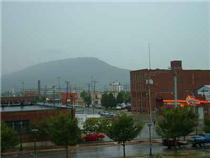
Morris Freeman loved rainy days like this. Click to enlarge.
photo by Harmon Jolley
I wish to dedicate this article to the memory of my aunt, Inez M. Jolley, who passed away earlier this year. A couple of years ago, she suggested that I write an article on “the umbrella repairman.” It had been nearly forty years since she had lived here, and she didn’t remember his name or the exact location of his business. I had imagined this to be a street vendor, instead of a permanent business.
The breakthrough in the article came recently. A friend recalled working at the United Cigar Store and said that there was a business nearby on East Ninth that sold and repaired umbrellas. He said that the proprietor’s name was Freeman. With the name and store location noted, I then raced to the city directories and news clipping files at the library, and the rest is history.
According to my trusty 1965 World Book, the umbrella (from the Latin word for “little shadow”) originated in ancient Egypt, mainly as a means of protection from the abundant sunshine along the Nile. The umbrella still serves us today, usually as a portable roof to keep the rain in the Tennessee Valley from soaking us.
At some point, umbrellas start to show the effects of weathering too many storms. We see a rib that’s pulled loose, a leak seeping through worn fabric, or worst of all, an umbrella blown inside-out by a gust. Though most worn-out umbrellas end up in the trash today, Morris Freeman once brought them back to good health at his umbrella shop at 5 East Ninth Street.
In 1905, nineteen year-old Morris Freeman, not wanting to join the army of the Czar, left his native Russia for the United States. He worked in a Massachusetts skate factory and sold umbrellas house-by-house, all while learning to speak English. His umbrella customers helped him to learn the language.
In 1914, two years after gaining U.S. citizenship, Morris Freeman relocated to Chattanooga after being encouraged by a relative who was living here. He was delighted to hear of our abundant rainfall.
By 1924, Mr. Freeman established a store at 5 East Ninth Street. The small 18 by 20-foot shop joined others which were crowded into the end of the block bounded by Market, Ninth, and Cherry streets. Among them were the R.N. Crane produce stand, the Louis Demos confectionery, the United Cigar Store, the Savoy Hotel, and the Ellis Restaurant, which later moved farther south on Market Street.
In the early years of Freeman’s shop, most umbrellas were constructed of silk with wood handles. Mr. Freeman still conducted outdoor marketing by walking around downtown with umbrellas under each arm. He was said to love rainy days, and believed that “the rain would fall on the just and unjust alike and then both of them would get wet if they didn’t have an umbrella.”
The depression and war years of the 1930’s and 1940’s may have caused an increase in umbrella repair, as customers looked for ways to stretch resources. Morris Freeman knew the value of money, having arrived in the United States with only fifty dollars, some of which was quickly taken by swindlers.
In 1954, as part of the anticipated West Side freeway and bridge project, Ninth Street was widened. Morris Freeman’s shop was among those to be shaved away by the demolition. He was the first and the last tenant at 5 East Ninth. Among his neighbors were the Mexican Chili King and the Foot-So-Port shoe store.
Times had changed since he greeted his first drenched customer. Umbrellas were now made of nylon and rayon, and had actually decreased in price since he started the business. By 1962, he was semi-retired and repairing only a few umbrellas each week.
Morris Freeman passed away in 1970, survived by his wife, Lena, and two sons, David and Harold. Both of his sons were honor graduates of Chattanooga High School. Harold became an attorney in Cincinnati, while S. David Freeman became an engineer and later, chairman of TVA. Morris Freeman was particularly proud of being able to send his sons to college. He recalled in a March 13, 1962 Chattanooga News-Free Press interview that in the Russia of his youth, only the very wealthy could send their children to college.
If you have memories of Morris Freeman, please send me an e-mail at jolleyh@bellsouth.net.